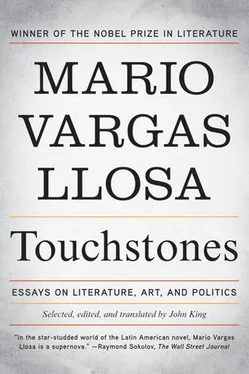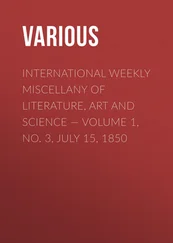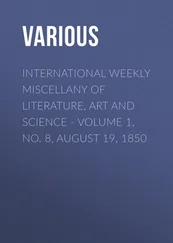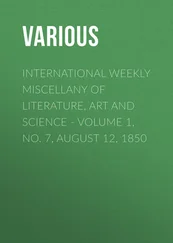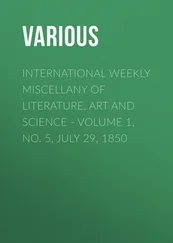Culture creates a sense of community, by recognising the humanity of others, beyond the differences between ethnicities, creeds and languages. Vargas Llosa does not support the neo-imperial argument that globalisation equates with Americanisation, and he uses this essay to focus his attack on nationalism in whatever form. Collective identity, the breeding ground of nationalism, is, for him, an ideological fiction:
When we explore the cultural, ethnic and social mix that is Latin America, we find that we are linked to almost all the regions and cultures of the world. And this, which prevents us from having a unique identity — we have so many that we have none — is, contrary to what nationalists believe, our greatest wealth. It also gives us excellent credentials for us to feel fully-fledged citizens in the global world of today.
Cervantes had intuited such a world when he talks about Don Quixote and Sancho Panza moving in a world of ‘homelands’, where, before the barriers of the nation state are erected, the characters carry their sense of place with them, in a landscape where boundaries are porous.
In contrast to this image of fluidity, Vargas Llosa sees nationalism as an abiding ill. In an essay written just after losing the presidential election in 1990, he states:
Nationalism is the culture of the uncultured, the religion of the demagogue, and a smokescreen behind which prejudice, violence and often racism can be found lurking…It is the easiest thing in the world to play the nationalist card to whip up a crowd, especially if that crowd is made up of poor and ignorant people who are looking to vent their bitterness and frustration on something or someone.
This essay is structured around an appreciation of the work of Isaiah Berlin, who became increasingly influential on Vargas Llosa’s thought as he moved away from his socialist convictions of the 1960s. Berlin’s essays began to appear, thanks to the dedicated editorial work of his former student Henry Hardy, from 1978 with the volume Russian Thinkers . The collection Against the Current came out in 1979. The title of Vargas Llosa’s volumes of collected essays, Contra viento y marea ( Against the Wind and the Tide ), which first appeared in 1986, alludes to Berlin’s title.
Berlin provides Vargas Llosa with certain ways of expressing a liberal credo, such as the term ‘negative’ liberty, which allows individuals to do what they want as long as this does not impinge on other people’s freedom, as opposed to ‘positive’ liberty (the basis of socialism and communism), which seeks to use politics to liberate people from either inner or outer barriers or repressions. Democratic government in the main offers a better guarantee of negative freedom than other regimes. Vargas Llosa often quotes Berlin’s insight that the values underlying democracy — equality, freedom and justice — usually contradict each other, leading to possible conflict and loss. It was because of these contradictory values that Berlin came to reject any notion of an ideal society or ideal human behaviour, an insight that would inform Vargas Llosa’s criticism of utopias, in particular the utopia of socialism.
Berlin also offered a reading of historical thinkers that pointed out the roots and the dangers of cultural nationalism — for example, in the German Romantic movement, with its insistence on a distinctive German Kultur . Ultimately, Berlin was perhaps too much the rationalist for Vargas Llosa, in need of a dose of Georges Bataille, although Michael Ignatieff’s biography of Berlin — reviewed in this volume — conveys to Vargas Llosa a much more complex character than the belle lettriste essayist might reveal, a man riven by torment and self-doubt.
Berlin was less interested in commenting on contemporary politics, and when he did so he lacked the subtlety of his philosophical and historical essays. The intellectual Jean-François Revel, by contrast, was very much immersed both in the everyday (as the editor of L’Express ) and in current political upheavals. He began his career as a philosopher; according to Vargas Llosa, he never stopped writing about philosophy, basing his discussions around a current problem or event. Revel was a man who showed him that ‘journalism can be highly creative, a genre that can combine intellectual originality with stylistic elegance’. Revel’s own intellectual trajectory was not dissimilar to that of Vargas Llosa: he had started out on the left, critical of De Gaulle and a candidate in the 1960s for Mitterrand’s Parti Socialiste, but he came to reject the authoritarianism of socialist parties and governments in such works as La Tentation totalitaire (1976) and Le Terrorisme contre la démocratie (1987). In his obituary to Revel, published on 7 May 2006 in El País , Vargas Llosa states that they became friends in the 1970s, ‘comrades on the barricades’ because neither of them were ashamed at being called liberals. Perhaps they also shared a sense of being caught up in continual polemic, as he points out when reviewing Revel’s memoirs: ‘These memoirs show Revel on top form: ardent, troublesome and dynamic, passionate about ideas and pleasure, insatiably curious and condemned, because of his unhealthy intellectual integrity and his polemical stance, to live in perpetual conflict with almost everyone around him’.
Karl Popper is the third political theorist whom Vargas Llosa quotes extensively (see the essay on Arguedas in this volume). In his essay ‘Karl Popper Today’ (‘Karl Popper al día’), Vargas Llosa talks about Popper’s theses, in particular the idea of relative rather than absolute truths, truths that must always be submitted to a process in which conjectures are refuted by more plausible conjectures. This means that all dominant truths must be constantly subject to questioning and revision. Criticism — the exercise of freedom — thus becomes the basis of progress. Critical intelligence dispels dogma and mythical or magic thinking. There is a progression from ‘closed’ societies, dominated by the tribe and magical thinking, to ‘open’ societies — from the ‘first world’ of things or material issues to the ‘third world’ of art, science and culture in general. This definition of tribal thought is premised on the belief that there are certain truths that cannot be doubted: in such thinking the roots of religious or political fanaticism can grow. The danger of closed societies is that they tend to embrace utopian ideas. In such ‘historicism’ lies the road to fascism and communism. 7Vargas Llosa talks of his immersion in Popper’s work at the time he was campaigning for the Peruvian presidency. In his treasured hour or two of reading each day he would read novels or testing works such as those of Popper: ‘Ever since The Open Society and Its Enemies fell into my hands in 1980, I had promised myself to study Karl Popper. I did so in these three years, every day, early in the morning, before going out for my daily run, when it was just barely daylight and the quiet of the house reminded me of the prepolitical period of my life.’ 8
While on occasion Vargas Llosa does talk about theoretical ideas in the abstract, in the main he is a consummate storyteller, and his ideas usually emerge with greatest clarity when he describes a scene or responds to a concrete situation. The dangers of ‘closed’ thinking can be seen in the horrors of the 9/11 bombings. The terrorists needed to bomb New York, he argues, since that city represents everything that is open and plural:
I have always felt in New York that I was in the centre of the world, in modern Babylon, a sort of Borgesian aleph, containing all the languages, races, religions and cultures of the planet, a place that, like a giant heart, sends out to the furthest corners of the globe fashions, vices, values, trivia, ways of behaving, music and images that have been formed by the incredible mixture of people in the city. The feeling of being a tiny grain of sand in an Arabian Nights cosmopolis might be somewhat depressing; but, paradoxically, it is at the same time very energising, as Julio Cortázar once remarked about Paris: ‘It is infinitely preferable to be nothing in a city that is everything than to be everything in a city that is nothing’. I never felt what he felt about the capital of France; but in New York, yes, every time.
Читать дальше
